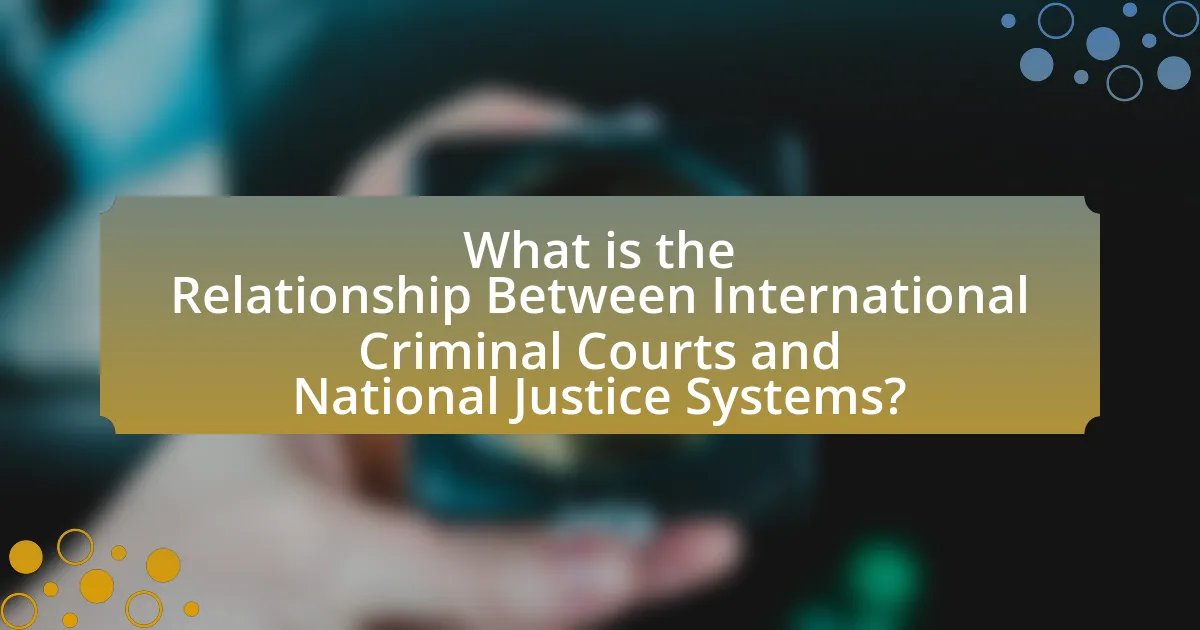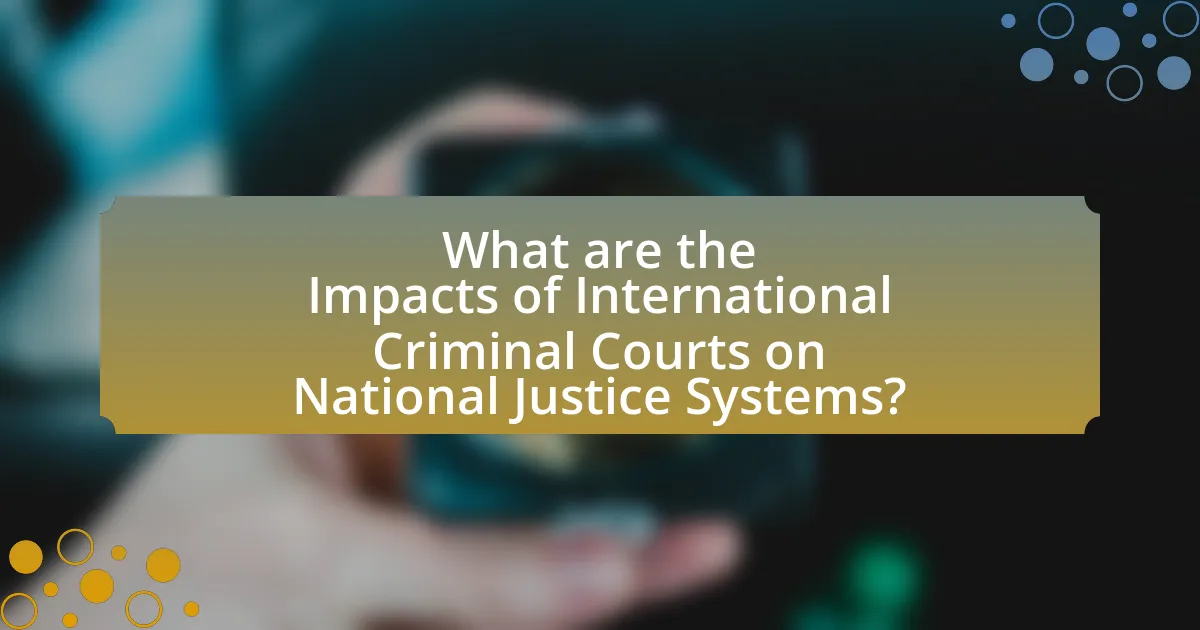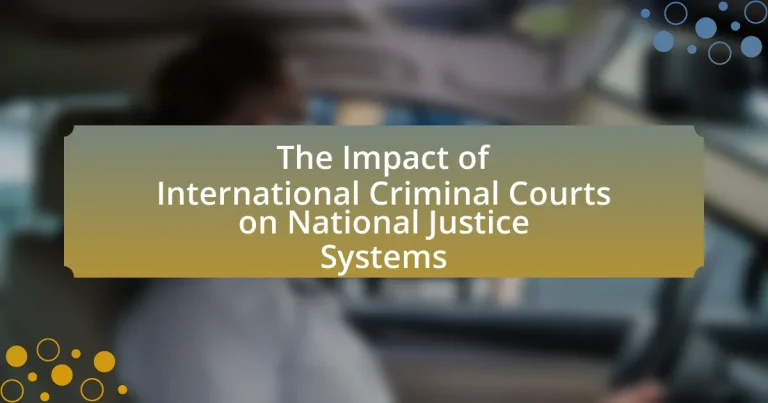International Criminal Courts (ICCs) are judicial institutions designed to prosecute individuals for serious international crimes, including genocide, war crimes, and crimes against humanity. This article examines the role of ICCs, particularly the International Criminal Court established by the Rome Statute, in promoting accountability and justice while influencing national legal systems. It discusses the operational framework of ICCs, their relationship with national courts, the challenges they face, and their impact on legal consistency and cooperation. Additionally, the article highlights best practices for national justice systems to enhance their effectiveness in relation to ICCs, ultimately reinforcing the rule of law and addressing impunity on a global scale.

What are International Criminal Courts and their Purpose?
International Criminal Courts are judicial institutions established to prosecute individuals for serious international crimes, such as genocide, war crimes, and crimes against humanity. Their primary purpose is to ensure accountability for these offenses, promote justice, and deter future violations by holding perpetrators accountable under international law. The International Criminal Court (ICC), established by the Rome Statute in 2002, exemplifies this function, as it operates independently of national jurisdictions and can intervene when states are unwilling or unable to prosecute offenders. The establishment of such courts aims to reinforce the rule of law globally and support national justice systems by providing a framework for addressing egregious crimes that transcend borders.
How do International Criminal Courts operate within the global legal framework?
International Criminal Courts operate within the global legal framework by prosecuting individuals for serious international crimes such as genocide, war crimes, and crimes against humanity. These courts, including the International Criminal Court (ICC), function based on treaties like the Rome Statute, which establishes their jurisdiction and procedural rules. The ICC, for instance, complements national judicial systems, intervening only when states are unwilling or unable to prosecute offenders. This principle of complementarity ensures that international courts uphold accountability while respecting state sovereignty. The effectiveness of these courts is evidenced by their ability to bring high-profile leaders to justice, thereby influencing national justice systems to strengthen their own legal frameworks and accountability mechanisms.
What are the key functions of International Criminal Courts?
International Criminal Courts primarily serve to prosecute individuals for serious international crimes such as genocide, war crimes, and crimes against humanity. These courts aim to ensure accountability for perpetrators, deter future crimes, and provide justice for victims. Established under treaties like the Rome Statute, the International Criminal Court (ICC) operates on the principle of complementarity, meaning it intervenes only when national courts are unwilling or unable to prosecute. This function reinforces the rule of law and promotes the development of national legal systems by encouraging states to uphold their obligations to prosecute such crimes domestically.
How do these courts differ from national courts?
International criminal courts differ from national courts primarily in their jurisdiction and scope. International criminal courts, such as the International Criminal Court (ICC), prosecute individuals for serious crimes like genocide, war crimes, and crimes against humanity, which transcend national boundaries. In contrast, national courts primarily handle domestic legal matters and enforce national laws within their respective jurisdictions.
Additionally, international courts operate under treaties and agreements among states, which grant them authority to intervene in cases where national courts are unable or unwilling to prosecute. For example, the ICC can exercise jurisdiction over crimes committed in member states or by their nationals, even if those states choose not to prosecute. This distinction highlights the international courts’ role in addressing crimes that have global implications, whereas national courts focus on local legal issues.
Why were International Criminal Courts established?
International Criminal Courts were established to prosecute individuals for serious international crimes such as genocide, war crimes, and crimes against humanity. The establishment of these courts aims to ensure accountability, deter future crimes, and provide justice for victims, thereby reinforcing the rule of law at both international and national levels. The International Criminal Court (ICC), created by the Rome Statute in 1998, exemplifies this effort, as it seeks to complement national judicial systems and address gaps in accountability where national courts are unwilling or unable to prosecute.
What historical events led to the creation of these courts?
The establishment of international criminal courts was primarily driven by the aftermath of World War II, particularly the Nuremberg Trials, which set a precedent for prosecuting war crimes and crimes against humanity. These trials highlighted the need for a permanent judicial mechanism to address such atrocities, leading to the formation of the International Criminal Court (ICC) in 2002. The ICC was established to ensure accountability for serious international crimes, reflecting a global consensus on the necessity of justice for victims and the prevention of impunity. The Genocide Convention of 1948 and the establishment of ad hoc tribunals for the former Yugoslavia and Rwanda further underscored the international community’s commitment to addressing egregious violations of human rights, thereby solidifying the framework for international criminal justice.
How do International Criminal Courts aim to address impunity?
International Criminal Courts aim to address impunity by prosecuting individuals for serious crimes such as genocide, war crimes, and crimes against humanity. These courts, including the International Criminal Court (ICC), establish legal accountability for perpetrators, thereby deterring future violations. For instance, the ICC’s jurisdiction allows it to intervene when national courts are unwilling or unable to prosecute, reinforcing the principle of complementarity. This principle was highlighted in the Rome Statute, which emphasizes that national jurisdictions have the primary responsibility to prosecute, but the ICC can step in to ensure justice is served. By holding individuals accountable, these courts contribute to the establishment of a global norm against impunity, promoting the rule of law and human rights.

What is the Relationship Between International Criminal Courts and National Justice Systems?
International Criminal Courts (ICCs) operate alongside national justice systems to address serious crimes that transcend national boundaries, such as genocide, war crimes, and crimes against humanity. ICCs, like the International Criminal Court established by the Rome Statute in 2002, complement national systems by prosecuting individuals when national courts are unwilling or unable to do so, thereby reinforcing the principle of accountability. This relationship is characterized by the principle of complementarity, which asserts that ICCs will only intervene when national jurisdictions fail to prosecute effectively, as seen in cases like the prosecution of Sudanese President Omar al-Bashir. Furthermore, ICCs can influence national justice systems by promoting legal standards and practices, encouraging states to strengthen their own judicial processes to avoid ICC intervention.
How do International Criminal Courts influence national legal processes?
International Criminal Courts influence national legal processes by establishing legal precedents and promoting accountability for serious crimes. These courts, such as the International Criminal Court (ICC), provide a framework that encourages national jurisdictions to adopt similar legal standards and practices. For instance, the ICC’s emphasis on prosecuting war crimes and crimes against humanity has led many countries to strengthen their own legal systems to comply with international norms, as seen in the adoption of laws in nations like Uganda and Kenya following their engagement with the ICC. Additionally, the presence of international courts can lead to increased cooperation between national and international legal systems, fostering a culture of accountability and justice that aligns with global human rights standards.
What are the mechanisms of influence on national justice systems?
The mechanisms of influence on national justice systems include legal frameworks, international treaties, and the role of international criminal courts. Legal frameworks establish standards that national systems are encouraged to adopt, while international treaties, such as the Rome Statute, create obligations for states to cooperate with international courts. The International Criminal Court (ICC) influences national justice systems by promoting accountability for war crimes and crimes against humanity, compelling states to align their laws with international norms. For instance, the ICC’s involvement in cases like the prosecution of leaders in Kenya has prompted national reforms in legal procedures and accountability measures.
How do national courts respond to the rulings of International Criminal Courts?
National courts generally respond to the rulings of International Criminal Courts by incorporating those rulings into their legal frameworks, often leading to domestic prosecutions or adjustments in national laws. For instance, when the International Criminal Court (ICC) issues a ruling, national courts may use it as a precedent to guide their own judicial processes, particularly in cases involving war crimes or crimes against humanity. This response is evident in various countries that have amended their legislation to align with international standards set by the ICC, thereby reinforcing the principle of complementarity, which allows national jurisdictions to prosecute crimes when they are unable or unwilling to do so.
What challenges do national justice systems face due to International Criminal Courts?
National justice systems face significant challenges due to the existence and operations of International Criminal Courts (ICCs), primarily in terms of jurisdictional conflicts, resource allocation, and legal harmonization. Jurisdictional conflicts arise when ICCs assert authority over crimes that national courts also seek to prosecute, leading to tensions regarding sovereignty and the effectiveness of local legal systems. Resource allocation becomes strained as national systems may divert funds and personnel to comply with ICC mandates or to address cases that overlap with ICC interests, potentially undermining local justice efforts. Furthermore, legal harmonization presents a challenge as national laws may differ from international standards, complicating prosecutions and creating inconsistencies in legal interpretations. These challenges are evidenced by instances where national courts have struggled to prosecute war crimes due to ICC involvement, as seen in countries like Kenya and Sudan, where ICC interventions have complicated domestic legal proceedings.
How do these challenges affect the sovereignty of nations?
Challenges posed by international criminal courts can significantly undermine the sovereignty of nations by imposing external legal standards and jurisdiction over domestic legal systems. When international courts, such as the International Criminal Court, intervene in national matters, they can limit a nation’s ability to independently govern its legal processes and enforce its laws. For instance, the principle of complementarity, which allows international courts to prosecute cases only when national courts are unwilling or unable to do so, can lead to perceptions of diminished authority and control over justice. This dynamic can create tensions between national sovereignty and international legal obligations, as seen in cases where countries have resisted extradition requests or have withdrawn from international treaties to maintain their judicial autonomy.
What are the implications for legal consistency and cooperation?
Legal consistency and cooperation are significantly impacted by the establishment of international criminal courts, which create a framework for harmonizing legal standards across jurisdictions. This framework encourages nations to align their domestic laws with international norms, fostering a unified approach to justice. For instance, the Rome Statute of the International Criminal Court (ICC) has prompted many countries to adopt legislation that criminalizes genocide, war crimes, and crimes against humanity, thereby enhancing legal consistency. Furthermore, cooperation among states is facilitated through mutual legal assistance treaties and extradition agreements, which are often influenced by the operational mandates of international courts. This collaborative environment not only strengthens the enforcement of international law but also promotes accountability, as evidenced by the increased number of prosecutions for international crimes in national courts following the establishment of the ICC.

What are the Impacts of International Criminal Courts on National Justice Systems?
International Criminal Courts (ICCs) significantly influence national justice systems by promoting accountability for serious crimes and encouraging legal reforms. ICCs, such as the International Criminal Court established in 2002, serve as a mechanism to prosecute individuals for genocide, war crimes, and crimes against humanity, which can lead to national courts adopting similar standards and practices. For instance, countries like Uganda and the Democratic Republic of the Congo have reformed their legal frameworks to align with international norms following ICC interventions. This alignment often results in enhanced judicial processes and increased cooperation between national and international legal entities, thereby strengthening the rule of law within affected nations.
How do International Criminal Courts promote accountability in national systems?
International Criminal Courts promote accountability in national systems by establishing legal precedents and encouraging states to adhere to international law. These courts, such as the International Criminal Court (ICC), hold individuals accountable for crimes like genocide and war crimes, thereby reinforcing the principle that such actions will not go unpunished. This creates a deterrent effect, motivating national governments to strengthen their legal frameworks and prosecute offenders domestically. For instance, the ICC’s involvement in cases like the prosecution of former Congolese warlord Thomas Lubanga has prompted the Democratic Republic of the Congo to enhance its own judicial processes. Additionally, the courts provide a platform for victims to seek justice, which can lead to greater public awareness and pressure on national systems to improve accountability measures.
What role do these courts play in prosecuting war crimes and crimes against humanity?
International criminal courts play a crucial role in prosecuting war crimes and crimes against humanity by providing a legal framework for accountability and justice. These courts, such as the International Criminal Court (ICC), investigate and prosecute individuals accused of serious violations of international law, thereby deterring future crimes and promoting the rule of law. For instance, the ICC has successfully prosecuted cases like that of Thomas Lubanga, who was convicted for enlisting child soldiers, demonstrating the court’s effectiveness in addressing egregious offenses. Additionally, these courts often complement national justice systems by encouraging states to strengthen their own legal frameworks and ensuring that perpetrators cannot evade justice.
How do they influence the development of national laws and policies?
International criminal courts influence the development of national laws and policies by establishing legal precedents and promoting adherence to international standards. These courts, such as the International Criminal Court (ICC), provide frameworks for prosecuting crimes like genocide and war crimes, which national legal systems may adopt to align with international norms. For instance, the Rome Statute, which established the ICC, has led many countries to amend their domestic laws to incorporate definitions of crimes and procedures consistent with international law. This alignment not only enhances the legitimacy of national justice systems but also fosters cooperation between states in prosecuting transnational crimes, as seen in the increased collaboration among nations following the establishment of the ICC.
What are the positive outcomes of International Criminal Courts on national justice systems?
International Criminal Courts positively influence national justice systems by promoting accountability for serious crimes, enhancing legal standards, and fostering cooperation among states. These courts serve as a deterrent against impunity, encouraging national governments to prosecute war crimes and crimes against humanity. For instance, the establishment of the International Criminal Court (ICC) has led several countries to amend their laws to align with international standards, thereby strengthening their judicial frameworks. Additionally, the ICC’s involvement in cases has prompted national courts to improve their investigative and prosecutorial capacities, as seen in countries like Uganda and the Democratic Republic of the Congo, where local legal systems have been bolstered through collaboration with international entities.
How do these courts enhance the rule of law in member states?
International criminal courts enhance the rule of law in member states by establishing accountability for serious crimes, thereby deterring future violations. These courts, such as the International Criminal Court (ICC), provide a legal framework that holds individuals, including state leaders, accountable for war crimes, genocide, and crimes against humanity. This accountability fosters a culture of respect for human rights and legal norms within member states. For instance, the ICC’s involvement in cases like the prosecution of former leaders in countries such as Sudan and Libya has reinforced the principle that no one is above the law, thereby strengthening national legal systems and promoting justice.
What benefits do victims of crimes experience from these courts’ involvement?
Victims of crimes experience several benefits from the involvement of international criminal courts, primarily through enhanced access to justice and recognition of their rights. These courts provide a platform for victims to participate in legal proceedings, allowing them to present their experiences and seek reparations. For instance, the International Criminal Court (ICC) has established mechanisms for victim participation, which can lead to greater accountability for perpetrators and a sense of validation for victims. Additionally, international courts often set precedents that influence national legal systems, promoting the incorporation of victim rights into domestic laws. This can result in improved support services and legal protections for victims at the national level, as seen in countries that have adopted reforms following ICC rulings.
What are the criticisms and limitations of International Criminal Courts’ impact?
International Criminal Courts face significant criticisms and limitations regarding their impact on national justice systems. One major criticism is the perception of bias, as these courts are often accused of disproportionately targeting leaders from specific regions, particularly in Africa, which raises concerns about fairness and impartiality. Additionally, the effectiveness of these courts is limited by their reliance on state cooperation for arrests and evidence, which can hinder prosecutions when states are unwilling to comply. Furthermore, the lengthy and complex legal processes can lead to delays in justice, undermining the courts’ credibility and effectiveness. Studies, such as those by the International Crisis Group, highlight that these limitations can result in a lack of deterrence for future crimes, as perpetrators may feel emboldened by the courts’ inefficiencies.
How do critics argue that these courts can undermine national sovereignty?
Critics argue that international criminal courts can undermine national sovereignty by asserting jurisdiction over crimes that states may prefer to handle domestically. This encroachment on a nation’s legal authority is seen as a challenge to the principle of self-determination, where states are expected to manage their own justice systems without external interference. For instance, the International Criminal Court (ICC) has been criticized for prosecuting individuals from countries that have not ratified the Rome Statute, leading to claims that it imposes foreign legal standards on sovereign nations. Additionally, critics highlight that the involvement of international courts can pressure national governments to conform to international norms, potentially overriding local laws and cultural practices.
What are the limitations in the enforcement of International Criminal Court decisions?
The limitations in the enforcement of International Criminal Court (ICC) decisions include issues of state cooperation, lack of enforcement mechanisms, and political considerations. States that are not party to the Rome Statute are not obligated to comply with ICC decisions, which undermines the court’s authority. For instance, countries like the United States and China have not ratified the Rome Statute, limiting the ICC’s ability to enforce its rulings within those jurisdictions. Additionally, the ICC relies on member states to arrest and surrender individuals, which can be hindered by political motivations or lack of willingness to act. This was evident in the case of Sudanese President Omar al-Bashir, who faced ICC charges but was not arrested during his travels to various countries. Furthermore, the ICC’s lack of its own police force means it cannot independently enforce its decisions, relying instead on the goodwill of states to fulfill their obligations. These factors collectively restrict the ICC’s effectiveness in enforcing its decisions and achieving justice on an international scale.
What best practices can national justice systems adopt in relation to International Criminal Courts?
National justice systems can adopt several best practices in relation to International Criminal Courts (ICCs) to enhance their effectiveness and cooperation. Firstly, establishing legal frameworks that align with international standards, such as the Rome Statute, ensures that national laws support the prosecution of international crimes like genocide and war crimes. This alignment facilitates cooperation with ICC investigations and prosecutions.
Secondly, national justice systems should invest in training and capacity-building for legal professionals, including judges, prosecutors, and investigators, to enhance their understanding of international law and procedures. For example, programs developed by organizations like the International Criminal Court and the United Nations have proven effective in improving the skills of legal practitioners in various countries.
Additionally, fostering collaboration between national authorities and the ICC can lead to better information sharing and joint investigations. Countries that have established formal mechanisms for cooperation, such as memoranda of understanding, have seen improved outcomes in handling cases involving international crimes.
Lastly, promoting public awareness and understanding of international justice can strengthen support for national efforts to address serious crimes. Engaging civil society and the media in discussions about the role of ICCs and their impact on national justice systems can enhance transparency and accountability.
How can national systems improve cooperation with International Criminal Courts?
National systems can improve cooperation with International Criminal Courts by enacting comprehensive legal frameworks that align domestic laws with international obligations. This alignment facilitates the effective prosecution of international crimes, as evidenced by the implementation of the Rome Statute in various countries, which has led to increased collaboration in extradition and evidence sharing. Additionally, national systems can enhance training for law enforcement and judicial officials on international law, thereby fostering a better understanding of the roles and responsibilities in relation to the International Criminal Courts. Such measures have been shown to strengthen the overall capacity of national systems to respond to international justice mandates effectively.
What strategies can enhance the effectiveness of national prosecutions influenced by these courts?
Strengthening national prosecutions influenced by international criminal courts can be achieved through several strategies. First, enhancing legal frameworks by aligning national laws with international standards ensures that prosecutions are consistent and effective. For instance, countries that have adopted the Rome Statute have improved their legal provisions for prosecuting war crimes and crimes against humanity.
Second, fostering collaboration between national and international judicial bodies facilitates knowledge transfer and resource sharing. This collaboration can be seen in cases where national prosecutors receive training from international court officials, improving their investigative and prosecutorial skills.
Third, increasing public awareness and support for accountability can create a conducive environment for prosecutions. Public campaigns highlighting the importance of justice can mobilize community support, as evidenced by successful initiatives in countries like Rwanda, where local engagement has bolstered national prosecutions post-genocide.
Finally, ensuring the protection of witnesses and victims is crucial for the integrity of prosecutions. Implementing robust witness protection programs, similar to those used by the International Criminal Court, can encourage more individuals to come forward, thereby strengthening cases against perpetrators.


